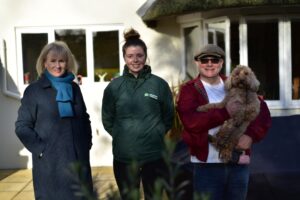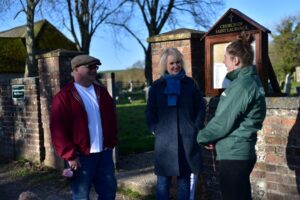
In November 2020, as lockdown pressures continued to bear hard on people, here at Digital Dorset we wanted to help some of the communities that were suffering the most – those with the poorest broadband.
The Covid pandemic meant we were far more reliant on the internet for working, home schooling, accessing important services like health, shopping and staying connected with our loved ones.
For people living in areas of very poor broadband connection, the increased reliance on online services brought home just how big the digital divide was for them.
But there was one national scheme that could offer hope for people in rural areas – the government’s UK Gigabit Voucher scheme, which Dorset Council has provided an additional £1m for our residents and businesses.
The Digital Dorset team identified several communities it felt could benefit, promoting the voucher scheme to them and introducing them to broadband suppliers.
One of those areas, Affpuddle, took the bull by the horn and now has some of the fastest internet speeds in the country. This is their story.
How a community took matters into its own hands to bring ultrafast broadband to its village
Adam and Sarah both live in Affpuddle but until recently had only met once over a parcel delivery.
Despite leading quite different lives – Sarah is a retired shop owner and Adam works from home as an IT infrastructure and server engineer – they had one thing in common that would eventually unite them and their neighbours: terrible internet connection.
Sarah, who has lived in Affpuddle for 15 years, said: “We’d each had dreadful experiences with our home internet. Adam was talking to a friend in nearby Tincleton who’d already been connected to full fibre broadband by Wessex Internet and spoke highly of them. Coincidentally, around about the same time I received a leaflet from Dorset Council which explained about government funding opportunities for people living in rural areas like us experiencing insufficient internet connectivity.”
Along with another neighbour, they set about investigating how to get their village better connected. Sarah produced leaflets and dropped them through people’s doors to gauge interest, whilst Adam researched broadband providers who covered their area.
By acting as ‘community champions’ for their village, the pair quickly became familiar with their neighbours’ needs – as well as gaining knowledge about internet connectivity where they lived.
More importantly, they discovered that they could collectively form a community scheme to show there was a demand for better broadband and get government support to fund the installation.
Sarah, a self-confessed ‘non techie’ focused on knocking on doors and spreading the word, whilst Adam’s research into service providers enabled them to respond to any questions that arose.
Next, they approached Blandford-based Wessex Internet and was introduced to Minna, their dedicated Community Engagement Manager.
Minna helped them with everything, from frequently asked questions about how to set up a community scheme, to providing leaflets and how to go about getting government funding for the cost of the full fibre installation.
Adam explained that the entire process from there was relatively quick – taking just eight months.
Once they had finalised the list of all those who were on board (the funding is dependent upon a minimum number of people willing to claim a voucher for improved broadband) Minna took care of everything.
This involved submitting the village’s funding request to the relevant central government department, keeping everybody informed of progress and confirming when the request was approved. Now, everyone can get full fibre connectivity direct to their properties.
We asked Adam and Sarah what they would say to other rural communities in the same position.
They both recommend communities contact the council in the first instance to find out what help is available. Neither had heard of the government funding scheme before but found that Rachel and the Digital team at Dorset Council were extremely helpful in the early stages.
The biggest challenges? For Adam it was finding the time outside his day job to get involved; Sarah’s was battling the weather. Both agreed wholeheartedly that they’d got to know more neighbours as a result, helped as well by the creation of a village WhatsApp group. Now that they’ve been connected to ultrafast broadband with speeds of 100 Mbps and more, everyone has noticed a real difference.
Adam said: “I no longer suffer from buffering; working from home often meant that I had to go to my Dad’s in Osmington to get a decent connection.
“One of our neighbours, when first approached by us summed it up: ‘Great news – I’ve waited 20 years for someone to connect me!’”
Minna, who has helped hundreds of communities in rural areas to get free installations to ultrafast broadband via government funding, added: “Sarah and Adam did a fantastic job bringing the village together, with the common aim of getting connectivity on par with that of towns and cities.
“Having people like this who are actively behind their community makes it so much more straightforward and quicker for everyone to get up and running. The success of this initiative is all down to them, which is why we always encourage and support community champions in all the areas we work in.”
The UK Government Voucher Scheme (UKGV) – how it works and who can benefit
The UKGV scheme is open to any rural residents or SME (small and medium) businesses if you meet the following criteria:
- Your current internet speed is less than 100 Mbps.
- You are officially classed as being rural.
- You are not in any announced commercial or state-funded broadband roll-out plans.
If you meet all the above, the government will fund up to £1,500 per residential household and up to £3,500 per business towards the installation of gigabit-capable broadband.
But there’s even better news for Dorset households and businesses.
Dorset Council has provided an additional £1m towards the scheme that means residents can get up to £2,500 in total and businesses £6,000. This extra funding gives schemes more chance of success.
Individual residents or businesses cannot apply on their own, there must be at least two households and/or businesses to apply before voucher funding is released. Realistically, you need as many people on board as possible to make a scheme successful.
Community champions work very effectively in generating enough interest from their neighbours.
Once you have enough interest, the next step would be to find a broadband supplier in your area to work with. It will be the broadband supplier that applies directly to the government for the voucher funding.
You can find out if you are eligible for voucher funding, and the broadband suppliers that are active in your area, here: Gigabit Vouchers (culture.gov.uk)
Any community that would like more advice about the voucher scheme can contact Dorset Council’s Digital team at connectingdorset@dorsetcouncil.gov.uk

I have worked in communications for 25 years, first as a journalist and then in public and private sector public relations. From Southampton originally, I have lived in beautiful Dorset for the last two decades. My passion for Dorset has also turned into a passion for landscape photography. My other great loves are my family and Southampton Football Club.

